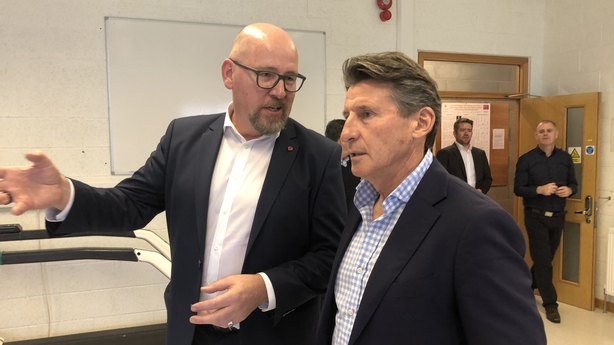The President of World Athletics, four-time Olympic medal winner Sebastian Coe, has praised the innovative work being undertaken by both academics and athletes at the University of Limerick's new Sport and Human Performance Research Centre, which he formally opened today.
Improving human performance in sport with innovative technology and statistical analysis is at the heart of wide-ranging research being carried out at the SHPRC, which seeks to advance interdisciplinary research in sport and other domains of human performance.
Work across esport science and weight category sports as well as athletics and rugby are all now under way at the centre, with the aim of practical application in sport.
Coe, who won four Olympic medals in middle-distance running, had a particular interest in the sprint start technology into false starts being developed by SHPRC researchers.
The Feasibility Analysis of Sprint Start Technologies [FASST] project seeks to develop new technologies for the optimal determination of response times and improve the detection of false starts in athletics competitions.
The research is being developed along with Irish track-and-field athlete Thomas Barr, who said their work found that as an athlete is sprinting off the starting blocks, their hands move before their feet.
This can be used to narrow the margin for error for false starts.

Coe said he was very impressed with the work in this area, noting that there have been many false starts this season, with World Athletics perhaps needing to review its race-starting protocols.
He said the work being done at SHPRC is of huge importance in this regard.
Sarah Lavin, a 100m hurdler who trains at UL, praised the innovative work being done there and said it is hugely beneficial for athletes to know that they are getting the best possible and most accurate information across competitions.
"Athletics is very black and white - it's very objective and everything is very measured from the time you leave the starting blocks to a photo finish, and as someone who has experienced how one thousandth of a second has mattered on both sides of the watch and how you can win or lose a race by this much, it's important that all the information and stats around a race are accurate," she said.
Prof Drew Harrison, a Co-Director of SHPRC, said its establishment recognises the multidisciplinary expertise and cutting-edge research taking place at UL in the field of sports performance.
The Irish Rugby Injury Surveillance or IRIS project also taking place there is actively working with the IRFU to enhance the health and welfare of rugby players across all ages in the domestic game, from schools rugby to the international level, looking at injury epidemiology, concussion biomarkers, and referee development.
"It's highlighting where injuries occur in schools rugby, and if we know more about the incidence of injuries, we'll know more about how to care for our rugby players," Prof Harrison said.







